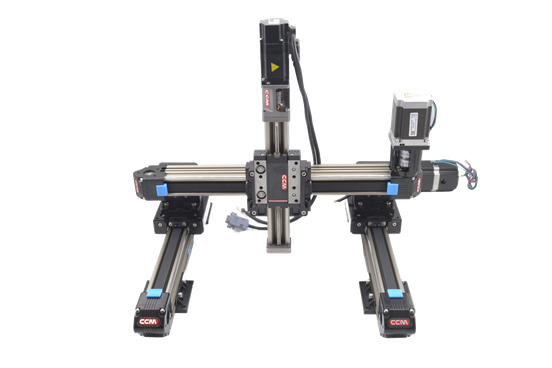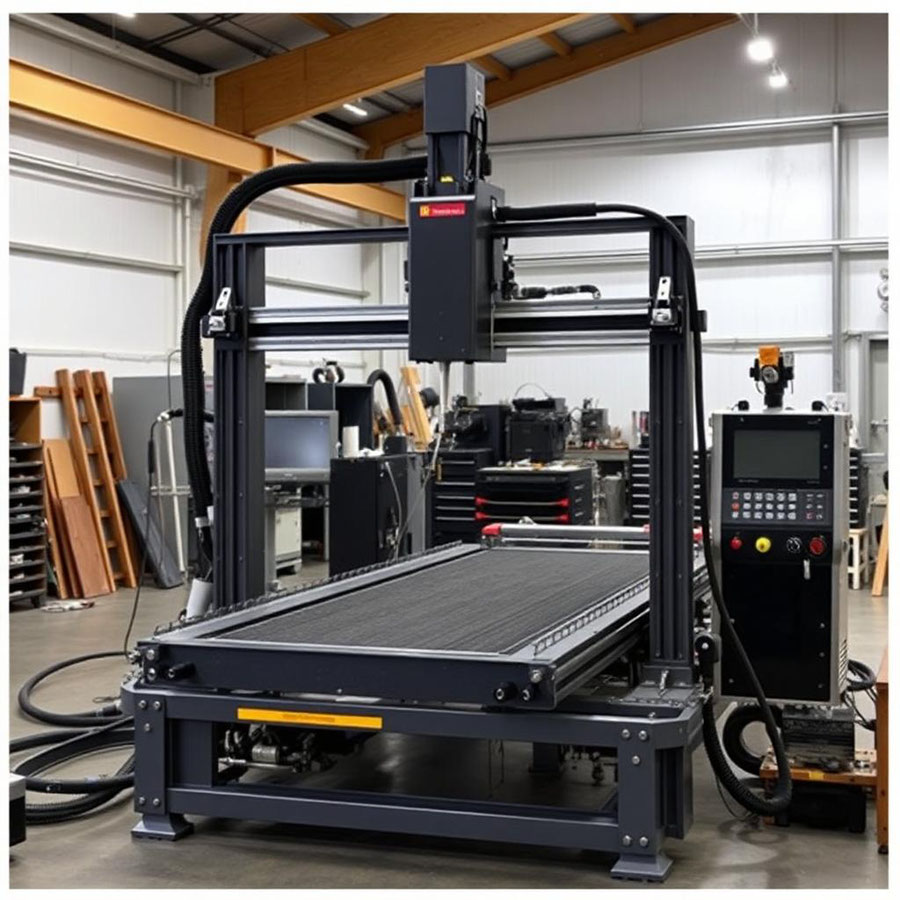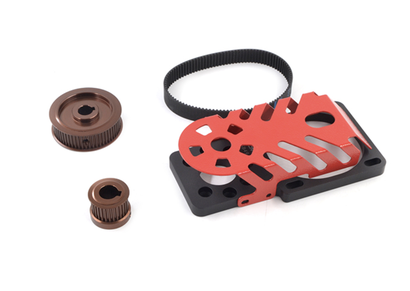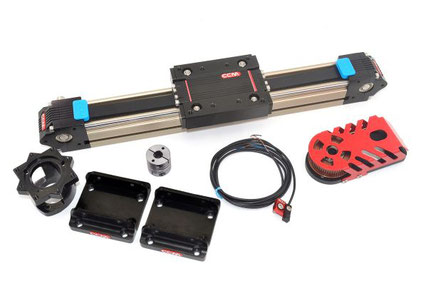CCM H45-20 Linear guide rails belt driven for CNC gantry.

Looking for the Right Linear Guide Rail for Your Application?
We understand how overwhelming it can be to choose the right linear guide rail when so many options online look similar and claim high performance. That’s why we’ve made it simple for you.
You have two clear options:
1. Stay here and check the technical specifications of our precision-engineered linear guide rail modules.
or check
2. How to Choose the Right Belt-Driven Linear Rail—Without Wasting Time or Money. Avoid common pitfalls, decode tech specs, and find the rail that fits your application perfectly.
Technical parameters of H45-20
-
Guide Width: 45 mm
-
Max Load: 20 kg
-
Pitch: 80 mm
-
Synchronous Wheel Spec: STD5M-16Z
-
Recommended Speed: ≤ 1.5 m/s
-
Customized Length: Up to 6 meters
-
Input Torque: ≤ 3 N·m
-
Belt Spec: PU-5M-15 (steel wire)
-
Straightness: 0.05 / 300 mm
-
Applicable Motors:
-
Stepper Motor: Nema 17 (Direct Connection)
-
Servo Motor: 100W (Direct Connection); 200W/400W (DC/Speed Reducer Set)
-
-
Suggested Length Adjustment: Effective stroke + 250 mm, with increments of 50 mm (e.g., 1000 mm, 1050 mm, 1100 mm)
This is the technical overview for the H45-20 linear motion module. If you require the full data sheet of the technical parameters, please contact us.
Features
-
High Precision – Engineered for accurate, repeatable motion in demanding applications.
-
Custom Lengths (up to 4 meters) – Tailored to fit your exact design and space requirements.
-
Corrosion-Resistant – Built with materials that withstand harsh environments and extend service life.
-
Maintenance-Free Operation – Designed for long-term use without regular servicing.
-
Ultra-Quiet Performance – Operates smoothly with minimal noise, ideal for sensitive settings.
-
Low Vibration – Ensures stable, consistent movement even at high speeds.
-
Trusted Reliability – Proven performance with minimal downtime across industries.
-
Long-Lasting Durability – Withstands continuous use under heavy loads and extended cycles.
-
Modular & Expandable – Easily integrates with accessories, sensors, and multi-axis systems.
Applications
-
Robotic Arms – Enables precise, repeatable linear motion for multi-axis automation.
-
3D Printers – Supports smooth, high-speed movement for accurate layer deposition.
-
CNC Router Machines – Ensures stable, rigid travel for cutting, milling, and shaping tasks.
-
Pick-and-Place Systems – Delivers fast, accurate positioning for high-throughput assembly lines.
-
Adhesive Dispensing Systems – Maintains controlled motion for uniform glue application.
-
Automated Painting Machines – Provides smooth, vibration-free movement for even coatings.
-
Packaging Equipment – Supports efficient and synchronized operations in automated packing lines.
-
Industrial Coding & Labeling Machines – Enables precise product marking and serialization.
-
Gantry Robots – Ideal for large-area, multi-axis systems requiring synchronized linear travel.
How to order
-
Tell Us About Your Project
Share your application details, goals, or challenges—our team is here to help. -
Provide Key Specs
Let us know the load weight, stroke length for each axis, travel speed, structure type, or environmental requirements. -
Receive a Tailored Quote
We’ll assess your needs and send you a detailed cost estimate—fast and accurate. -
Confirm & Start Production
Once payment is received, we’ll move your order into production with precision and care. -
We Handle the Shipping
We arrange safe and efficient delivery to your door, anywhere in the world.
-
Share Your Feedback
Your input matters—let us know how we did so we can keep improving.
🛠️ The Best Things You Can Do When Building a CNC Machine

Plan smart. Build strong. Cut clean.
Whether it’s for milling, routing, or engraving, here are the key best practices to follow when building your CNC machine:
1. ✅ Invest in High-Quality Linear Motion Components
Your cuts are only as good as your movement.
🔧 Use precision linear guide rails with belt or ball screw drives. For light-to-medium loads, belt-driven actuators offer speed and low maintenance. For heavy-duty milling, ball screws deliver accuracy under force.
2. ✅ Build on a Rigid, Vibration-Resistant Frame
Flex or vibration = ruined workpieces and tool wear.
🔧 Use steel or thick aluminum for the frame, and reinforce all corners. A rock-solid base ensures clean, repeatable cuts.
3. ✅ Choose the Right Spindle (and Power Supply)
The spindle is your cutting tool’s heart—don’t underpower it.
🔧 Match your spindle to the material (wood, plastic, aluminum, etc.) and intended feed rates. Ensure you have the right voltage, cooling, and speed control (VFD if needed).
4. ✅ Use Limit Switches and Emergency Stops
Safety and precision go hand-in-hand.
🔧 Install limit switches on all axes to prevent crashes, and wire an emergency stop to instantly cut power in case of failure.
5. ✅ Plan for Dust Management and Cooling
Dust and chips damage components and reduce visibility.
🔧 Add a vacuum or dust collection system. For metalworking, consider flood or mist cooling to protect tools and improve surface finish.
Bonus: ✅ Tune, Test, and Calibrate EVERYTHING
This is where great machines separate from good ones.
🔧 Dial in steps per mm, backlash, tool offsets, squareness, and acceleration. Run test cuts and tweak settings until motion is smooth and precise.
🔧 Final Word:
Your CNC machine is only as reliable as the parts you put into it—and the thought you put behind the build.
Start with quality linear motion systems, build on a rigid base, and don’t rush calibration.
Need help picking the right rails, actuators, or motion system? We’re here to support your build.
Other Models
Accesories for linear guide rails


